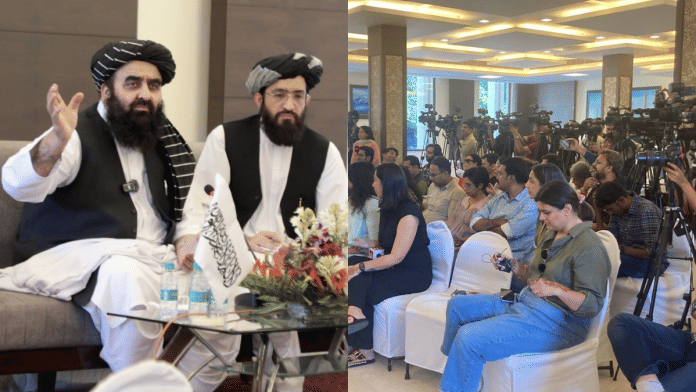New Delhi: Afghanistan’s Acting Foreign Minister Amir Khan Muttaqi Sunday defended the Taliban’s record on women’s education, claiming 2.8 million are studying at seminaries across the country, while addressing a press conference here also attended by women journalists, following criticism over his previous media interaction with only male scribes.
Muttaqi’s visit to India has come under a cloud of criticism from a section of the Indian opposition and the media for his first press conference here Friday. When questioned about the total absence of female journalists at that press conference, Muttaqi Sunday said it was a “technical issue”.
“With regards to education, at present we have 10 million students attending schools and other educational institutes, of which, 2.8 million are women and girls. In religious seminaries, this educational opportunity is available all the way to the graduation level. There are certain limitations in specific parts, but that does not mean that we oppose education. We have not declared it religiously ‘haram’,” Muttaqi said.
Some international estimates indicate that since the return of the Taliban to power in 2021, at least 1.5 million Afghan girls have been excluded from its education system. Girls have been prevented from attending schooling above primary level, while a large number of women have been excluded from public life in the country.
In a similar vein, Muttaqi held a press conference with select journalists Friday, which had the presence of not a single women journalist. The exclusion of women journalists from the media interaction was criticised by a section of the Indian opposition. When questioned on the matter, Muttaqi said that it was held on “short notice and a short list of journalists was decided”.
“It was more a technical issue… Our colleagues had decided to send an invitation to a specific list of journalists and there was no other intention apart from this,” Muttaqi said in response to questions raised by the journalists present Sunday.
The conference Sunday was attended by a number of journalists representing media houses both domestic and international. In the second press conference, Muttaqi was seated in front of the white flag of the Taliban, with the Shahada inscribed on it.
India does not formally recognise the Taliban regime in Kabul. It maintains recognition of the internationally accepted government of the Islamic Republic of Afghanistan, which fell on 15 August 2021, when the Taliban recaptured Kabul.
The embassy premises in New Delhi still flies the flag of the republic government and not the Taliban standard.
Muttaqi is in New Delhi for a six-day visit from 9-15 October. India sought a special waiver from the United Nations Security Council, as Muttaqi is on the 1988 (2011) sanctions list of the UNSC, which prevents him from leaving Afghanistan.
The acting Afghan foreign minister met External Affairs Minister S. Jaishankar Friday, as India seeks to build a better working relationship with the Taliban, amid the deterioration in the ties between Islamabad and Kabul. Late Saturday night, Taliban forces launched attacks across the Durand Line.
A Taliban spokesperson has claimed 58 Pakistani military personnel as killed. However, Islamabad has disputed the figure, asserting that 23 were dead.
The Jaishankar-Muttaqi meet is the highest level of interaction between New Delhi and the Taliban regime, as it looks to carve out space for Indian interests in Afghanistan. Muttaqi warned Pakistan—which has been long considered as the main backers of the Taliban—that Kabul has “different options” if Islamabad does not want peace across the Durand Line.
Furthermore, Muttaqi hit out at Pakistan Sunday, calling on Islamabad to rein in their own militant groups, and to stop blaming Kabul for its own domestic security issues. The acting Afghan foreign minister rejected Pakistan’s claims of presence of the Tehreek-i-Taliban Pakistan (TTP) within Afghanistan.
‘The premises is ours’
During the meeting with Muttaqi, Jaishankar announced that India will be upgrading its technical mission in Kabul to the status of an embassy, indicating that New Delhi will welcome further diplomatic engagement, while stopping short of formally recognising the Taliban regime.
Muttaqi Sunday said that the Taliban will soon appoint its own diplomats to its embassy in New Delhi. Previous Taliban appointees have been allowed to carry out work in its missions in India as caretakers, without full diplomatic recognition.
“This embassy in Delhi is completely under our control. All those who fought against us, even they are working with us,” Muttaqi told the assembled media Sunday, while seated in front of the Taliban’s flag.
The question of the usage of the Taliban flag or the Republic flag is one of diplomatic protocols. With formal recognition, the Taliban standard would be allowed to be raised over its embassy in New Delhi. At the meeting with Jaishankar, no flags were present. In the earlier press conference Friday, a small Taliban standard was placed in front of Muttaqi, while there was no flag in the background.
On Sunday, Muttaqi defended the usage of the Taliban flag, declaring that the group declared its “jihad” under its banner.
“This is our flag…we fought Jihad under it,” Muttaqi declared when questioned over the usage of the Taliban banner at the press conference.
(Edited by Ajeet Tiwari)
Also Read: Taliban ‘pauses’ military action against Pakistan after Saudi-Qatar request, denies harbouring TTP






